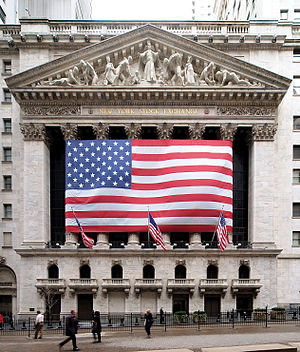THE stock market has been big news in recent days.
Last week’s report that Deutsche Börse, a giant German exchange,intends to buy the New York Stock Exchange, creating a company worth some $24 billion, arrived shortly after the Dow broke the 12,000-point barrier for the first time since before the financial crisis.
These developments drew headlines because they seemed to exemplify significant trends in the American economy. But look at America’s stock exchanges more closely, and there’s less to them than meets the eye. In truth, the stock market is becoming increasingly irrelevant — a trend that threatens the core principles of American capitalism.
These days a healthy stock market doesn’t mean a healthy economy, as a glance at the high unemployment rate or the low labor-market participation rate will show. The Tea Party is right about one thing: What’s good for Wall Street isn’t necessarily good for Main Street. And the Germans aren’t buying the New York Stock Exchange for its commoditized, highly competitive and ultra-low-margin stock business, but rather for its lucrative derivatives operations.
The stock market is still huge, of course: the companies listed on American exchanges are valued at more than $17 trillion, and they’re not going to disappear in the foreseeable future.
But the glory days of publicly traded companies dominating the American business landscape may be over. The number of companies listed on the major domestic exchanges peaked in 1997 at more than 7,000, and it has been falling ever since. It’s now down to about 4,000 companies, and given its steep downward trend will surely continue to shrink.
Nor are the remaining stocks an obvious proxy for the health of the American economy. Innovative American companies like Apple and Google may be worth hundreds of billions of dollars, but most of them don’t pay dividends or employ many Americans, and their shares are essentially speculative investments for people making a bet on how we’re going to live in the future.
Put another way, as the number of initial public offerings steadily declines, the stock market is becoming little more than a place for speculators and algorithms to compete over who can trade his way to the most money.









